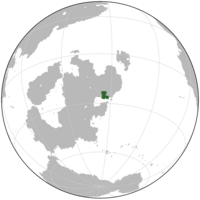Louisianian Republic
Louisianian Republic | |
|---|---|
| Anthem: My Sweet Home | |
 | |
| Capital and largest city | New Chatrois |
| Official languages | Gagian Louisiana Creole |
| Recognised national languages | Semharan Onotenian An-Naas Odehen Daganian Fluvan Lisan Kalaam |
| Ethnic groups (2022) |
|
| Religion (2020) |
|
| Demonym(s) | Louisianian |
| Government | Federal parliamentary republic |
| Angélique Gaumont | |
| Jean Gigot | |
| Léon Cailloux | |
| Jean-Guy Rouzet | |
| Legislature | Parliament |
| Independence from Gagium | |
| June 1788 | |
• Republic | 30 April 1812 |
| 1985 | |
| Area | |
• Total | 182,123 km2 (70,318 sq mi) |
| Population | |
• 2022 estimate | 15,050,000 |
• 2013 census | 15,018,582 |
• Density | 82.46/km2 (213.6/sq mi) |
| GDP (nominal) | 2022 estimate |
• Total | |
• Per capita | |
| Gini (2022) | medium |
| HDI (2022) | very high |
| Currency | Galian Shekel ($) (NGS) |
| Date format | mm-dd-yyyy |
| Driving side | right |
| Calling code | +912 |
| ISO 3166 code | LO |
| Internet TLD | .lo |
Louisiana, officially the Louisianian Republic, is a country in northern Galia. It covers an area of 182,123 km2 and has a population of just over 15 million. It is bordered to the east by New Piedmont, to the north by Janolia, and to the west by Onotene. The Naossian Gulf forms the southern coastline of the country. Louisiana is a federal state subdivided into twelve parishes and the autonomous city of New Chatrois, which also serves as the capital and largest city of the nation. The parishes and New Chatrois have their own constitutions and governments but are subservient to the federal government. In addition to New Chatrois, other major cities include Villefluviale, Jaf, and Lafayette.
The earliest human presence in modern-day Louisiana dates back to the Paleolithic period. When the Dilanoyawathan Empire conquered the region, it was unable to take the small Gagian colony located on its borders. Louisiana would maintain its independence despite its location. After gaining independence in 1812 during the Gagian Revolution, Louisiana would establish itself as a small but economically powerful state in the region, seeing relative peace and stability, alongside immigration from neighboring countries and Gagium itself. During the First Great War, northern Louisiana formed a small but vital front. The country suffered occupation and extensive damage during the Second Great War and Third Great War, heavily impacting its quality of life. After the Third Great War, Louisiana partitioned Semhara with Iodaia and New Piedmont. In contrast to its neighbor, New Piedmont, Louisiana has failed to fully integrate much of its Semharan territory, and an extensive campaign against terrorism and Semharan nationalists is ongoing. Despite this, Louisiana has experienced postwar economic growth and rebuilding, becoming a developed country relative to its neighbors, though it still falls behind both New Piedmont and Iodaia on many indices.
Louisiana is a regional power and forms a crucial part of the North Galian Union. It is also a member of the Global Community, Trans-Galian Partnership, and Galian Entente. It is a developed country with a very high HDI, but struggles behind the more developed Galian states like Los Angeles, New Piedmont, and Iodaia.

